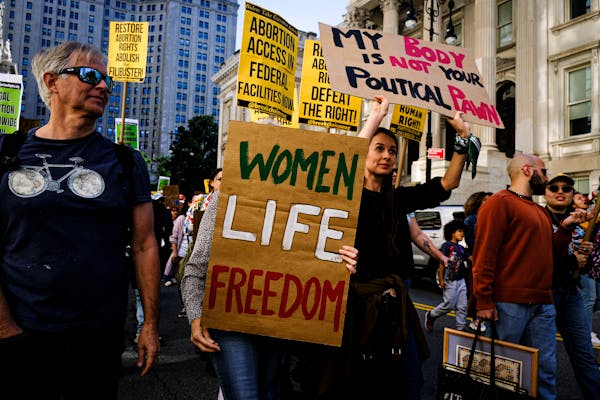New York abortion protest. “All”? “Most”? / Katie Godowski @ pexels.com
THE RELIGON GUY’S ANSWER:
Yes, but perhaps not much.
Starting with the news, the Public Religion Research Institute (PRRI) announced a poll showing 64% of Americans think abortion should be legal in “most or all” cases. However, dig into the internals and only 29% said “all” cases while 35% said “most,” indicating some restrictions. Meanwhile, Gallup found 51% want abortion “legal only under certain circumstances” with 34% favoring all circumstances.
With 22,465 respondents, PRRI can offer reliable numbers for religious groups. Also for each state, with special interest in eight battlegrounds whose 97 Electoral College votes are expected to decide a close election. State numbers combined “all” and “most” supporters minus detail on limitations: Arizona (60%), Georgia (63%), Michigan (63%), Nevada (76%), New Hampshire (74%), North Carolina (66%), Pennsylvania (63%), and Wisconsin (66%).
Regarding religion, leanings toward abortion limitations are shown in PRRI data distinguishing this “all” vs. “most” support: Black Protestants (33% and 39%), white “mainline” Protestants (26% and 42%), Hispanic Catholics (25% and 35%), white Catholics (24% and 38%), Hispanic Protestants (18% and 26%), Latter-day Saints (9% and 23%) and white evangelical Protestants (8% and 19%) — contrasting with Jews (44% and 35%) and religiously unaffiliated Americans (48% and 37%).
Will that affect votes? White evangelical and LDS voters are concentrated in states that are strongly Republican anyway, so abortion as such does not tilt elections. Democrats understandably figure pro-choice advocacy is their best 2024 argument with swing voters. Surveys suggest their pro-choice fervor causes limited trouble from religious voters in battlegrounds and it certainly pleases the increasingly vital bloc of Democrats without religious identity, the so-called “nones.”
Why go Republican?
Leaving aside heavily Protestant Georgia and North Carolina, between 18% and 25% of residents in the other six battlegrounds are Catholic. Political scientist Ryan Burge reports Catholics constituted 19% of the 1970s Republican coalition, rising to 25% by the 2010s. This crucial political shift mainly occurred with white Catholics, not Hispanics. In 2020, Biden won 65% of Hispanics but a USA Today poll puts him at 34%, which would be a November earthquake. Abortion could be a secondary or tertiary factor, especially with Hispanic evangelicals.
The U.S. Catholic bishops’ voter guide says “the threat of abortion remains our pre-eminent priority because it directly attacks our most vulnerable brothers and sisters.” Yet analysts think abortion is not mostly why white Catholics’ strong historical Democratic loyalty became a modest Republican majority. As that epochal shift began, political scientist John Green proposed that the church’s anti-abortion heritage helped detach wary Catholics from automatic Democratic voting to consider Republicans based on issues other than abortion.
PRRI documented the sharp divide between Democrats (86% saying “most” or “all”) vs. Republicans (only 36%). The 2020 Democratic platform declared “unequivocally” that “every woman should be able to access … safe and legal abortion,” and with taxpayer funding. Notably, the party specified no restrictions, implying unlimited choice in all stages of pregnancy and for any reason.
With Republicans, nominee Donald Trump, oddly, wanted no 2020 platform to run on. The 2016 platform attacked Democrats’ “almost limitless” freedom, endorsed a “human life amendment to the Constitution,” and declared “the unborn child has a fundamental right to life which cannot be infringed.” Notably, the party specified no exceptions, though in 2024 Republican candidates generally favor abortion for rape, incest, risks to a mother’s life, and often health dangers.
Living entities vs. women’s rights
It’s often said the question here is “when does life begin?” But science says when a genetically unique human zygote (fused egg and sperm) implants in a womb, the resulting entity is living and grows on its own. Thus the political problem is not whether a life exists but whether and when it might warrant protection, over against the rights and claims of a pregnant woman. The Supreme Court’s 2022 Dobbs decision returned abortion debates to the states, and much 2024 politicking involves stages of pregnancy, as follows.
The Catholic Church values unborn life from conception, so absolutely that it forbids abortion even with danger to a mother’s life. The largest U.S. Protestant denomination, the Southern Baptist Convention, affirms “the dignity and sanctity of human life at all stages of development, from conception to natural death,” and calls abortion “genocide.” Arizona’s law repealed May 2 barred all abortion, with a mother’s life exception. This outlook influenced the Alabama Supreme Court’s ruling, since nullified, that protected couples’ embryos stored at in vitro fertilization clinics.
Florida this month joined states that outlaw abortion after six weeks, with exceptions for a mother’s life or dire physical injury. Though this is around the time mothers first learn they’re pregnant, Florida’s reasoning is indicated by its “Heartbeat Protection Act” title. Actually, at six weeks the heart does not exist, only pulsations.
Missouri’s law put into effect with the Dobbs decision forbids abortion after eight weeks. The American Pregnancy Association says that’s the time when “everything that is present in an adult human is now present in your baby.” The widely-used “abortion pills” or “medication abortion,” at issue in the pending U.S. Supreme Court case of Food and Drug Administration v. A.H.M., can be administered up until ten weeks of pregnancy. Some states draw the line at 12 weeks, the end of the first trimester, but this line has no biological significance.
Toying with 15 weeks
This year, Trump toyed with the 15-week line proposed by Senator Lindsey Graham and the line drawn in Arizona’s replacement law. The rationale is that then, if not earlier, a human fetus suffers pain from abortion. Quickening, when a pregnant mother first feels the fetus move around 16 to 18 weeks, is not a factor in today’s debates.
Viability, when a fetus can live on its own outside the womb, exists around 23 or 24 weeks, sometimes earlier. The Supreme Court’s now-overturned Roe v. Wade decision set this line after which states could “regulate, and even proscribe,” abortion unless needed to preserve “the life or health of the mother.”
Birth? A Dobbs brief from the Unitarian Universalists and 53 other liberal faith groups said “numerous religious traditions posit that life begins at some point during pregnancy or even after a child has been born.” And atheistic Princeton University ethics Professor Peter Singer famously advocated death for defective human newborns, deemed to be non-persons with less value than “the life of a pig, a dog, or a chimpanzee.”














